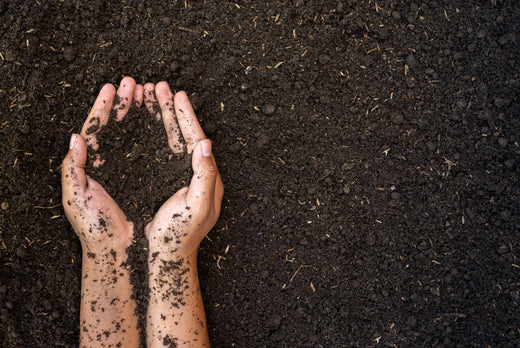
It all starts with the dirt
Share
When it comes to gardening, it all starts with the dirt. The soil in your garden isn’t just a place to anchor plants; it’s a living, breathing ecosystem that determines the health and productivity of your garden. Good soil is the foundation for thriving plants, and if you’re aiming for an organic, no-spray, lush garden, then it’s worth investing your time in building it up.
Why Good Dirt Matters
Healthy soil is like a buffet for your plants. It’s rich in nutrients, teeming with beneficial microbes, and well-structured to allow for proper drainage and aeration. Plants grown in nutrient-depleted soil often struggle to thrive. They’re more prone to pests, diseases, and lackluster growth. On the flip side, plants in nutrient-rich soil have strong root systems, vibrant leaves, and abundant yields.
If you’re starting with poor soil, don’t worry—nature provides a perfect solution: compost.
The Power of Compost
Compost is often called “black gold” for a reason. It transforms your soil into a powerhouse of fertility, packed with organic matter that feeds your plants and improves soil structure. Whether you’re growing vegetables, flowers, or herbs, adding compost creates a balanced environment where your plants can thrive.
Here’s what compost can do for your garden:
-
Improve Soil Structure: Compost loosens heavy clay soils and helps sandy soils retain moisture, giving roots the ideal conditions to grow.
-
Boost Nutrients: As compost breaks down, it releases essential nutrients that plants need, like nitrogen, phosphorus, and potassium.
-
Encourage Microbial Life: Healthy soil is alive with beneficial bacteria, fungi, and earthworms that help break down organic matter and make nutrients more accessible to plants.
-
Reduce Waste: Composting allows you to recycle kitchen scraps, garden clippings, and even chicken manure into a valuable resource for your garden, rather than sending them to the landfill.
The Benefits of Composting on the Homestead
For those of us living the homesteading life, composting is more than just a gardening practice—it’s a lifestyle choice that brings sustainability full circle. Here are some benefits:
-
Waste Reduction: Instead of throwing out vegetable peels, coffee grounds, and eggshells, you’re turning waste into something valuable.
-
Cost Savings: Composting at home eliminates the need for store-bought fertilizers and soil amendments.
-
Improved Soil Health: With a steady supply of compost, your soil stays healthy and productive year after year.
-
Better Plant Yields: Healthy plants mean better harvests, whether that’s a bumper crop of tomatoes or thriving pollinator-friendly perennials.
-
Environmental Impact: Composting reduces greenhouse gases by keeping organic waste out of landfills and enriches the soil without synthetic inputs.
Starting Your Composting Journey
If you’re new to composting, it’s easier than you think. Start small with a countertop composter for kitchen scraps (like the white one I keep handy), and build an outdoor compost pile or invest in a bin for yard waste and garden clippings. Remember to balance your greens (like veggie scraps) and browns (like dried leaves or cardboard) to keep your compost pile healthy.

Composting is a simple act with big rewards, both for your garden and for the environment. So, whether you’re growing your own food or filling your landscape with beautiful blooms, remember: it all starts with the dirt. Healthy soil, enriched with homemade compost, is the secret to a thriving, sustainable garden.
Happy gardening!
